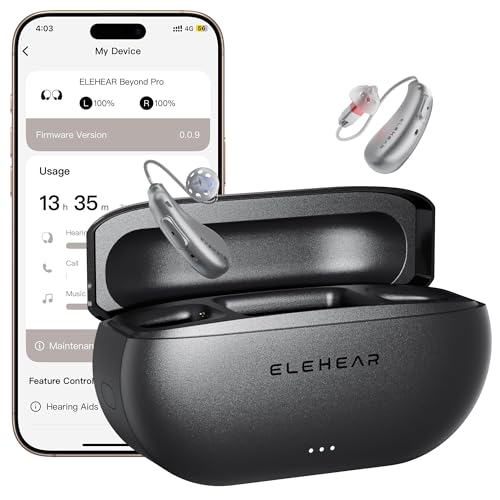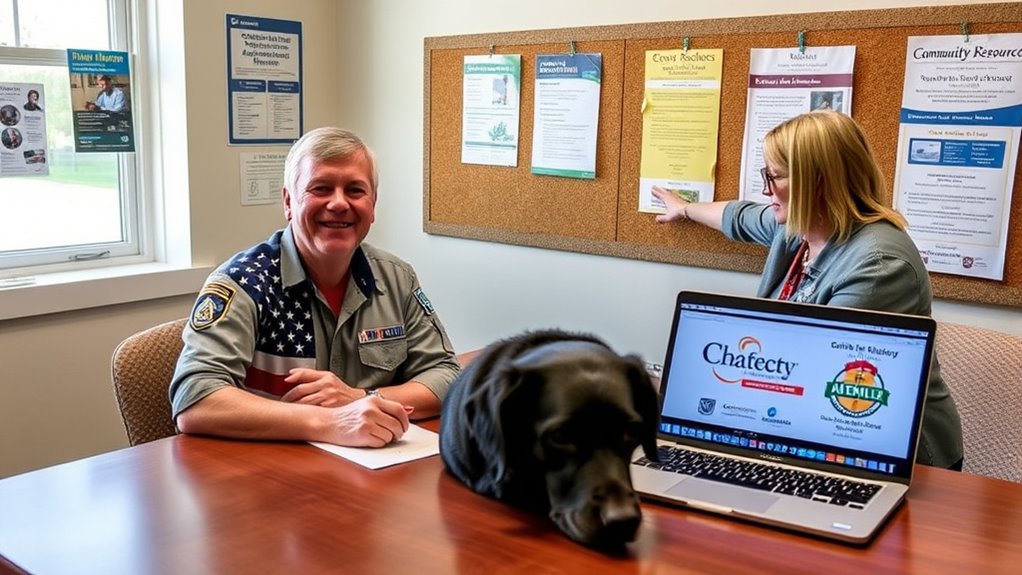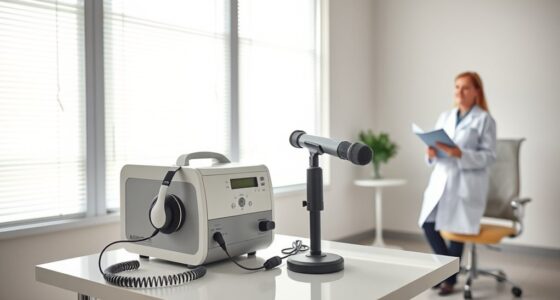Veterans with hearing loss face unique employment challenges, but specialized job programs and adaptive technologies are here to help. These initiatives connect you to tailored careers, offer skills development, and provide workplace accommodations like assistive devices and communication tools. Many veterans successfully shift into civilian roles with support from employer adaptations and community resources. To discover how these programs work and how they can support your journey, continue exploring these solutions.
Key Takeaways
- Specialized job placement programs connect veterans with roles suited to their communication needs and accessibility requirements.
- Skills development initiatives include training in assistive technology and adaptive communication techniques.
- Peer mentorship and personalized support foster confidence and aid successful civilian employment transitions.
- Community resources and partnerships with employers promote inclusive hiring practices for hearing-impaired veterans.
- Vocational rehabilitation programs emphasize resilience, tailored training, and mental health support to ensure employment stability.

ELEHEAR-Beyond Pro Hearing Aids, Bluetooth OTC Hearing Aids for Seniors and Adults, Premium Sound Algorithm with VocClear 2.0, 30% Clearer Speech, Music Mode & Enhanced App, Bluetooth Streaming
Ultra-clear, Natural Sound – Powered by VocClear 2.0 technology that delivers 30% clearer speech, ELEHEAR-Beyond Pro hearing aids…
As an affiliate, we earn on qualifying purchases.
As an affiliate, we earn on qualifying purchases.
Understanding the Unique Challenges Faced by Veterans With Hearing Loss

Veterans with hearing loss often face unique challenges that can affect their daily lives and employment prospects. Communication barriers may make it difficult to follow conversations, participate in meetings, or receive instructions clearly. These obstacles can lead to misunderstandings, frustration, and a sense of isolation. Fortunately, assistive devices like hearing aids, cochlear implants, and amplified phones can help improve communication, but adapting to these tools takes time. You might also encounter workplace environments that aren’t fully accommodating, which can hinder your ability to perform effectively. Recognizing these challenges is vital for seeking appropriate support and accommodations. Understanding how hearing loss impacts your interactions helps you advocate for yourself and find solutions that enable you to thrive both personally and professionally. Regular use of assistive technology and proper maintenance can significantly enhance communication and overall quality of life. Incorporating technology solutions tailored to your needs can further improve your ability to communicate effectively in diverse settings. Developing employability skills tailored to your needs can further support successful reintegration into the workforce. Additionally, advancements in AI in Education are creating new opportunities for accessible learning and training programs that can benefit veterans with hearing impairments. Moreover, awareness of employment programs designed specifically for veterans with disabilities can provide additional pathways to gainful employment and support.

Cochlear Implant Headbands for Adults, Pack of 5 – Secure Fit for Nucleus 7 & BTE Processors – Sweat-Wicking, Comfortable Headbands for Sports & Everyday Wear
SECURE FIT FOR BEHIND-THE-EAR PROCESSOR – Designed with added elastic to help keep behind-the-ear cochlear implant processors securely…
As an affiliate, we earn on qualifying purchases.
As an affiliate, we earn on qualifying purchases.
Overview of Specialized Job Placement Programs for Veterans

Specialized job placement programs are designed to connect veterans with tailored employment opportunities that accommodate their unique needs, including those with hearing loss. These programs focus on matching veterans to roles that consider communication preferences and accessibility, helping reduce stress and support mental health. They often partner with employers committed to inclusive hiring practices, ensuring job stability and growth. By addressing barriers like hearing impairment, these programs also promote housing stability, as steady employment provides financial security. Additionally, they offer personalized support, such as assistive technology and workplace accommodations, making it easier for veterans to succeed. Incorporating vibrational alignment techniques can enhance veterans’ confidence and resilience in their transition to civilian careers. Engaging in self-awareness practices can further empower veterans to navigate workplace challenges effectively. Moreover, integrating accessible communication strategies ensures that veterans with hearing loss can fully participate and thrive in their new work environments, especially when combined with assistive technology solutions tailored to individual needs. Developing mindfulness skills can also help veterans manage stress and improve focus during their career transition process. Overall, these initiatives aim to empower veterans, fostering independence and well-being in their civilian lives.

Panasonic Cordless Phone, 1 Handset Amplified Wireless Phone with Slow Talk, 40dB Volume Boost, 100dB Loud Visual Ringer, Hearing Aid Compatibility, Large Screen & Backlit Keypad – KX-TGM420W (White)
Hear and Be Heard, Loud and Clear: Boost the volume of the call with these cordless phones with…
As an affiliate, we earn on qualifying purchases.
As an affiliate, we earn on qualifying purchases.
Training and Skills Development Tailored for Hearing-Impaired Veterans

Training for hearing-impaired veterans focuses on effective communication and adaptive skills. You’ll participate in customized workshops that improve your ability to connect and collaborate. Additionally, you’ll learn to use adaptive technology and enhance your vocational skills to thrive in various work environments. Engaging in remote hackathons can provide opportunities to develop coding and problem-solving skills in a flexible, virtual setting. Incorporating vocational rehabilitation strategies can further support your transition into civilian employment. Developing specialized communication techniques can significantly boost your confidence and effectiveness in the workplace. Focusing on cost-effective solutions can help you select affordable tools and resources that suit your needs. Emphasizing powerful persuasive words in your communication can also boost your confidence and effectiveness in the workplace.
Customized Communication Workshops
Because effective communication is essential for daily life and employment, customized communication workshops are designed to help hearing-impaired veterans develop practical skills. These workshops focus on assistive communication techniques, enabling you to navigate conversations confidently. They also emphasize veteran outreach, ensuring you connect effectively in various settings. During training, you’ll learn strategies like visual cues, speechreading, and the use of assistive devices tailored to your needs. The goal is to improve your ability to communicate clearly, reducing frustration and enhancing job prospects. Incorporating preppy dog names can also serve as a confidence booster, providing familiar and positive associations during communication training. Additionally, understanding essential oil safety can help promote a calm and focused environment during these workshops, benefiting overall learning. Recognizing the importance of supportive role models can motivate you to stay engaged and committed to the training process. Incorporating tools such as electric bikes can also be a practical way to enhance mobility and independence outside of work settings. Engaging in interactive practice sessions further reinforces communication skills, making real-world interactions more comfortable. Whether in interviews or team settings, these workshops empower you to participate fully.
Adaptive Technology Training
Adaptive technology training equips you with the skills to effectively use devices designed to overcome hearing challenges. You’ll learn how to operate assistive technology like hearing aids, cochlear implants, and alert systems that enhance your daily communication. This training also includes communication training, helping you develop strategies to interact confidently in various settings. You’ll explore how to troubleshoot equipment and integrate new tools into your work environment. By mastering these devices and techniques, you gain greater independence and improve your ability to connect with others. The focus is on practical, hands-on learning tailored specifically to your needs, ensuring you’re prepared to navigate civilian workplaces more effectively. This training empowers you to leverage assistive technology fully, opening new opportunities and fostering greater confidence. Additionally, understanding AI security considerations can help you better protect your personal data and devices in digital environments. Recognizing security zone principles can further enhance your digital safety by understanding how to manage access and safeguard sensitive information. Incorporating knowledge from Audi Tuning, such as fine-tuning your communication devices for optimal performance, can also support your integration into civilian workplaces more smoothly.
Vocational Skill Enhancement
For hearing-impaired veterans, developing specialized vocational skills can open new career opportunities and boost confidence. Focused training programs help you build technical expertise tailored to your abilities, making you more competitive in the job market. These programs also foster mental resilience, equipping you to overcome challenges with a positive outlook. Peer mentorship plays a crucial role, providing support and shared experiences that motivate you to persist and improve. Through hands-on learning, you gain practical skills that align with your interests and strengths. This targeted development not only enhances your employability but also encourages personal growth. By combining skill training with emotional support, you set yourself up for a successful transition into civilian work, turning barriers into opportunities. Additionally, incorporating hydrocolloid technology in skincare routines can help improve skin healing and confidence during this transition. Understanding digital literacy is also essential for adapting to modern workplace environments and communication tools. Developing communication skills tailored for hearing-impaired individuals can further enhance your professional interactions and integration. Emphasizing the importance of AI security in safeguarding personal information can also reassure you as you navigate new employment environments.

Retekess TT119 Assistive Listening System, Church Translation System, Mute Function, 300m/980ft, Simultaneous Interpretation Devices for Church, Court (1 Transmitter 10 Receivers)
Transmission range; 300m/980ft long working distance allows for transmission over greater distances; this is useful in scenarios where…
As an affiliate, we earn on qualifying purchases.
As an affiliate, we earn on qualifying purchases.
Technology and Tools Supporting Communication in the Workplace

Technology plays a essential role in improving communication for veterans with hearing loss at work. Assistive listening devices and real-time captioning tools can help you stay engaged and understand conversations better. Exploring these tools can make your workplace more accessible and inclusive.
Assistive Listening Devices
Assistive listening devices play a essential role in helping veterans with hearing loss communicate effectively in the workplace. These devices enhance hearing technology, making conversations clearer and reducing background noise. Personal FM systems, for example, transmit sound directly to your hearing aids or assistive listening devices, improving speech understanding in meetings or crowded environments. Loop systems create magnetic fields that work with compatible hearing aids to deliver sound directly to your ears. Over-the-ear amplifiers are portable tools that boost sound levels, helping you follow conversations easily. By integrating assistive listening devices into your daily routine, you can participate more fully in work activities, boost confidence, and reduce frustration caused by hearing challenges. These tools are essential for promoting effective communication and a more inclusive work environment.
Real-Time Captioning Tools
Real-time captioning tools have become essential in supporting effective communication for veterans with hearing loss in the workplace. These tools transcribe spoken words instantly, allowing you to follow conversations clearly. They work well alongside hearing aid options, helping to fill in gaps and improve understanding. Using real-time captioning can boost your confidence during meetings and team discussions. When preparing for a job interview, consider practicing with captioning tools to familiarize yourself with the technology. This also helps you develop job interview tips, such as requesting accommodations or explaining your communication needs upfront. By integrating captioning tools into your daily routine, you create a more inclusive environment that supports your success and ensures you stay engaged and informed at work.
Success Stories: Veterans Who Have Transitioned Into Civilian Careers

Many veterans with hearing loss have successfully shifted into civilian careers, demonstrating resilience and adaptability. These individuals often prioritize mental health and family reintegration, recognizing their importance in a smooth progression. By leveraging job programs tailored for veterans, they build new skills and find roles that suit their strengths. Success stories often highlight overcoming communication hurdles and managing stress, which improves overall well-being. Reentering civilian life can be challenging, but these veterans show that with support, they can thrive professionally and personally. Their journeys inspire others facing similar obstacles, proving that hearing loss doesn’t have to limit career ambitions. Through determination and the right resources, many have turned new pages, balancing career growth with a healthy mental state and stronger family bonds.
Partnering Organizations and Community Resources

Partnering organizations and community resources play a crucial role in supporting veterans with hearing loss as they move into civilian careers. These groups provide essential services like job training, mental health support, and community outreach to guarantee veterans feel connected and empowered. Community outreach programs help raise awareness about hearing challenges and promote accessible workplace accommodations. Partner organizations often collaborate with local clinics, veteran centers, and mental health providers to address both employment and emotional well-being. By offering tailored resources, they help veterans navigate the transition smoothly, reducing feelings of isolation and stress. Your participation in these programs can enhance your job prospects and mental health, creating a strong support network that understands and addresses your unique needs as a veteran with hearing loss.
How Employers Are Adapting to Support Hearing-Impaired Employees

Employers are making workplace accommodations more common to support hearing-impaired employees. They’re also implementing new technology to improve communication and guarantee everyone stays connected. These changes help create a more inclusive environment for all team members.
Workplace Accommodations Increase
As awareness of hearing impairments grows, workplaces are increasingly adopting accommodations to support hearing-impaired employees. These workplace accommodations help individuals with hearing loss perform their jobs effectively and feel included. Employers are implementing strategies like providing captioned phone systems, visual alert systems, and clear signage to improve communication. Adjustments such as quiet workspaces and flexible schedules also make a difference. By recognizing the challenges faced by those with hearing loss, companies create a more accessible environment. This shift not only benefits employees but also enhances overall productivity and morale. As you navigate your career, knowing that workplaces are actively increasing accommodations can make you feel more confident about your ability to succeed and thrive in your role.
Technology Enhances Communication
Advancements in technology are transforming how workplaces support hearing-impaired employees. Employers now utilize a range of tools, including assistive devices and modern hearing aids, to foster effective communication. These innovations help bridge gaps and ensure everyone stays connected. For example, speech-to-text apps transcribe conversations in real time, while visual alert systems notify employees of important sounds. Many workplaces also adopt video conferencing with captioning features, making remote communication accessible.
| Device Type | Functionality | Benefits |
|---|---|---|
| Assistive Devices | Transcribe speech, amplify sound | Clearer understanding |
| Hearing Aids | Enhance sound quality in noisy environments | Improved hearing in context |
| Captioning Tools | Convert spoken words to text in real-time | Facilitates seamless communication |
| Visual Alerts | Signal alarms or notifications visually | Ensures safety and awareness |
Navigating the Certification and Support Process for Veterans

Exploring the certification and support process can feel overwhelming, but understanding the steps makes it manageable. Start by completing your benefits application thoroughly, providing all necessary documentation of your hearing loss and service record. This initiates the certification process, where your condition is officially recognized. Once certified, you’ll receive documentation that can help access various support services and accommodations. It’s essential to stay organized, keep copies of all forms, and follow up regularly to track your application’s progress. If you encounter delays or need clarification, don’t hesitate to contact veteran support organizations or your benefits counselor. By staying proactive, you can simplify exploring the certification process and ensure you get the assistance you need to succeed in your civilian career.
The Role of Advocacy and Policy in Enhancing Employment Opportunities

Advocacy and policy play an essential role in opening up employment opportunities for veterans with hearing loss. They help ensure workplace accommodations, like assistive technology, are mandated and accessible. By pushing for inclusive policies, advocates also promote mental health support, reducing stress and anxiety linked to employment struggles. These policies can improve housing stability, which directly impacts a veteran’s ability to seek and maintain work. When housing is secure, veterans are less distracted by instability and can focus on job training and employment. Advocacy groups influence legislation that protects veterans from discrimination and promotes fair hiring practices. Overall, strong policy frameworks empower veterans, fostering an environment where they can thrive professionally while maintaining mental health and housing stability.
Future Directions and Innovations in Veteran Employment Support

As technology continues to evolve, innovative solutions are emerging to better support veterans in their employment journeys. Future innovation in veteran employment will likely focus on personalized tools, such as AI-driven job matching platforms that account for hearing loss and other disabilities. Policy reform will also play a pivotal role, streamlining access to resources and reducing barriers for veterans seeking work. You can expect increased investment in adaptive technologies, like hearing-assistive devices integrated with workplace software. Additionally, ongoing efforts will emphasize flexible work arrangements, ensuring veterans can thrive in diverse environments. These advancements aim to create a more inclusive job market, empowering veterans to leverage their skills and experiences. Staying ahead of these trends will be essential to maximizing employment opportunities for all veterans.
Frequently Asked Questions
How Do Hearing-Impaired Veterans Access Specialized Job Placement Programs?
You can access specialized job placement programs for hearing-impaired veterans by reaching out to organizations like the VA or veteran service agencies. They often provide assistive technology to support communication and connect you with peer mentorship programs, offering guidance from others who understand your experience. These resources help you navigate employment opportunities and guarantee you get the support needed to succeed in civilian careers.
What Legal Protections Exist for Hearing-Impaired Veterans in the Workplace?
Think of the workplace as a well-tuned orchestra; everyone deserves to play their part. Laws like the ADA protect hearing-impaired veterans from disability discrimination, ensuring they’re not left in silence. Employers are required to provide workplace accommodations, like assistive listening devices, so you can perform your best. These protections help create an inclusive environment where your skills shine, no matter your hearing ability.
Are There Financial Assistance Options for Hearing Aids or Communication Technology?
You can access hearing aid subsidies and communication device grants to help cover costs for hearing aids or advanced communication technology. These financial assistance options are available through programs like the VA, which offers support to veterans with hearing loss. By applying for these programs, you can reduce out-of-pocket expenses and improve your ability to communicate effectively, making your progression to civilian life smoother and more manageable.
How Can Family Members Support Veterans During Their Employment Transition?
Supporting veterans during their employment progression is like guiding a ship through choppy waters. You can help by offering consistent family encouragement and emotional support, showing you believe in their abilities. Listen patiently to their concerns, celebrate small victories, and stay positive. This steady support helps veterans build confidence, making their journey smoother. Your presence acts as a lighthouse, illuminating their path as they navigate new work environments.
What Are Common Misconceptions About Hearing Loss and Employment Readiness?
You might think hearing loss means someone isn’t fit for work, but that’s a misconception. Many veterans use assistive devices and workplace accommodations to succeed. Hearing loss doesn’t automatically limit employment readiness; with proper support, they can excel. Employers who understand this help create inclusive environments, allowing veterans to perform their best. You should recognize these facts to support veterans effectively and dispel myths about hearing loss and employment.
Conclusion
While it’s ironic that hearing loss can make finding a job harder, innovative programs and supportive employers are proving that silence doesn’t mean the end of opportunity. With tailored training, technology, and advocacy, veterans with hearing impairments are confidently stepping into civilian careers. So, next time you think barriers are insurmountable, remember—sometimes, it’s the quietest voices that make the loudest impact. Your support can turn challenges into success stories.










